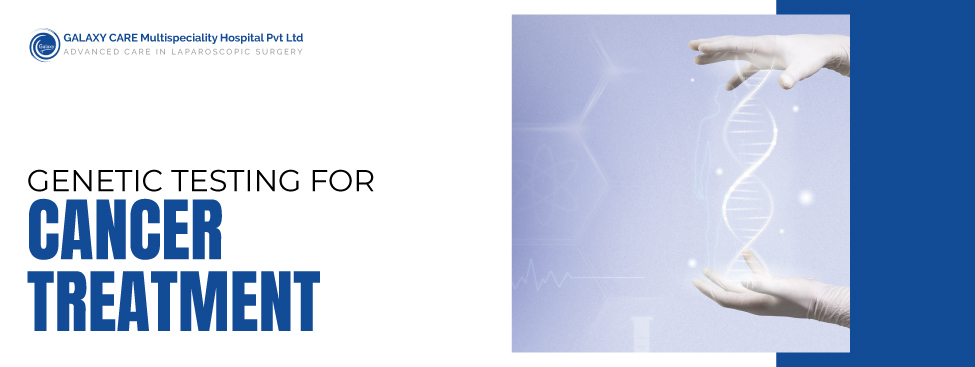
Genetic Testing is Transforming Cancer Treatment
Cancer treatment has evolved significantly over the years, with advances in technology and research leading to more targeted and effective therapies. One of the most groundbreaking developments in recent years is the use of genetic testing in cancer treatment. Genetic testing allows for a deeper understanding of an individual’s cancer at a molecular level, enabling doctors to personalize treatment plans and enhance patient outcomes. This shift from a one-size-fits-all approach to a more tailored, precision-based treatment strategy is transforming how cancer is diagnosed, treated, and managed.
As the Best Cancer Hospital in Pune, Galaxy Care Hospital leads the way in cancer treatment innovation. For years, we’ve been leveraging Genetic Testing to tailor personalized treatment plans, ensuring our patients receive the most effective approach from day one in their fight against cancer. Let us help you understand how genetic testing is transforming cancer treatment.
What is Genetic Testing?
Genetic testing involves analyzing a person’s DNA to detect changes or mutations that may be linked to specific diseases, including cancer. Mutations in certain genes can cause cells to grow and divide uncontrollably, leading to cancer. In the case of cancer, genetic testing typically focuses on identifying mutations or genetic alterations in the tumor’s DNA. These mutations may influence how the cancer behaves, how it spreads, and how it responds to different treatments.
For example, some cancers are driven by specific mutations that can be targeted with precision therapies. By identifying these mutations, doctors can make informed decisions about the best course of treatment, increasing the chances of success and minimizing harm to healthy tissues.
The Role of Genetic Testing in Personalized Cancer Treatment
Cancer is not a single disease but a complex collection of diseases that vary greatly from patient to patient. Even if two individuals have the same type of cancer, their tumors may have different genetic profiles, which can affect how cancer responds to treatment. As a result, the treatment that works for one patient may not be as effective for another.
This is where genetic testing comes in. By understanding the genetic makeup of a patient’s tumor, doctors can customize treatment plans to target the specific genetic alterations that are driving cancer’s growth. This personalized approach, known as precision medicine, allows for therapies that are more likely to be effective while sparing healthy cells from unnecessary damage. Precision medicine is rapidly becoming the cornerstone of modern cancer treatment, providing patients with the best chance for recovery and improved survival rates.
The Impact of Genetic Testing on Cancer Treatment
1. Precision Medicine
One of the most significant advantages of genetic testing in cancer treatment is the ability to implement precision medicine. By identifying the genetic alterations present in a patient’s cancer, doctors can select therapies that specifically target those mutations. This targeted approach can significantly improve treatment outcomes by attacking the cancer directly while minimizing damage to surrounding healthy tissues. Targeted therapies, such as those that block specific proteins or enzymes that cancer cells need to grow, have shown promising results in treating various cancer types.
2. Identifying Cancer Subtypes
Cancer is not a uniform disease. Even within the same cancer type, some subtypes may behave differently and require different treatment strategies. Genetic testing helps classify cancer into molecular subtypes based on genetic markers. For example, breast cancer can be classified into different subtypes such as HER2-positive, estrogen receptor-positive, and triple-negative, each requiring distinct treatment approaches. By identifying the genetic profile of the cancer, doctors can determine the best treatment plan and ensure the most effective therapies are chosen.
3. Predicting Treatment Response
Genetic testing also helps predict how a patient’s cancer will respond to various treatments. Some genetic mutations can indicate whether a particular treatment will be effective, allowing doctors to avoid therapies that are less likely to work. For instance, certain mutations in the EGFR gene in non-small cell lung cancer may make the cancer more susceptible to targeted drugs, while other mutations might cause resistance to treatment. This ability to predict treatment responses is a powerful tool in cancer care, enabling doctors to choose the most appropriate therapies and increase the likelihood of success.
Benefits of Genetic Testing in Cancer Treatment
1. Personalized Treatment Plans
Genetic testing allows oncologists to develop personalized treatment plans tailored to the unique genetic profile of a patient’s cancer. This approach ensures that the treatment is specifically designed to target the cancer’s mutations, providing the most effective therapy for that individual. Personalized treatments are not only more likely to be effective but can also reduce the need for trial-and-error approaches, saving time and resources while improving patient outcomes.
2. Fewer Side Effects
Traditional cancer treatments such as chemotherapy and radiation are often associated with a wide range of side effects. These treatments are not selective and can damage healthy cells along with cancerous ones. Genetic testing helps identify genetic markers that predict how a patient may respond to specific treatments, allowing doctors to select therapies that are more likely to avoid side effects. For example, if a genetic test reveals that a patient is likely to suffer severe side effects from certain chemotherapy drugs, doctors can opt for alternative therapies that are gentler on the body, enhancing the patient’s quality of life.
3. Early Detection of Cancer Recurrence
Another significant advantage of genetic testing is its ability to detect cancer recurrence early. By monitoring specific genetic markers associated with the cancer, doctors can detect signs of recurrence before symptoms appear. This early detection allows for timely intervention and treatment, which can improve the chances of successful treatment and survival. Genetic testing can also be used to monitor patients after treatment to ensure that the cancer has not returned or spread.
4. Improved Survival Rates
The use of genetic testing in cancer treatment has been shown to improve survival rates for many patients. By identifying the most effective therapies based on the genetic makeup of the cancer, patients receive treatments that are more likely to be successful. Furthermore, genetic testing allows doctors to avoid ineffective treatments, which not only improves survival rates but also minimizes unnecessary side effects. The ability to personalize cancer treatment has led to better outcomes and a higher quality of life for many cancer patients.
Challenges and Limitations of Genetic Testing
While genetic testing holds great promise, some challenges and limitations need to be addressed. One of the main barriers is the cost, as genetic tests can be expensive and may not always be covered by insurance. Additionally, the interpretation of genetic test results can be complex, requiring specialized knowledge and expertise. Not all genetic mutations have known or established treatment protocols, and some may have unclear implications for treatment.
Moreover, the availability of genetic testing can be limited in certain regions or healthcare settings. There is also the concern of privacy, as genetic data is highly personal, and patients must trust that their information will be handled securely and confidentially.
Conclusion
Indeed, Genetic testing is transforming cancer treatment! It is revolutionizing the way cancer is treated, offering a more personalized, effective, and targeted approach to cancer care. By identifying specific genetic mutations, oncologists can tailor treatment plans to each patient’s unique cancer profile, improving treatment outcomes, reducing side effects, and enhancing overall quality of life. As our understanding of cancer genetics continues to grow, genetic testing will play an even more crucial role in developing cutting-edge cancer therapies and improving survival rates.
At Galaxy Care Hospital, the Best Cancer Hospital in Pune, we recognize the importance of genetic testing as part of a comprehensive cancer treatment plan. Our team of experienced neurologists and neurosurgeons work closely with patients to analyze their genetic profiles and develop individualized treatment strategies that optimize success and minimize potential risks. With genetic testing, we are committed to providing patients with the best possible care on their journey to recovery.


